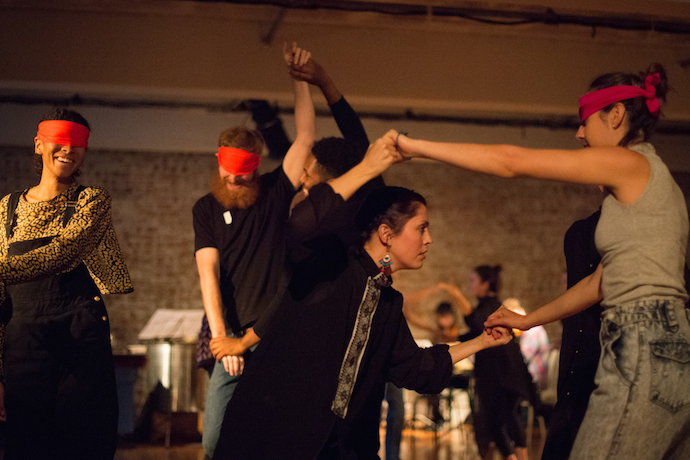
The Vaults, London Waterloo
By Jonny Venvell
Most people have at some point been moved by classical music. But what if music literally had the power to move us, push us, even dance with us and what would this feel like? These questions are fundamental to Bittersuite, a multi-sensory event company, whose performers are renowned for combining music, smell, taste, choreography – and for blindfolding their audiences. So it was this very set of questions that Steph Singer, the brain behind Bittersuite, set out to explore in her recent masterclass at the Vaults festival.
As she enthusiastically ushered us into the centre of Morley College’s auditorium, Singer explained that this was not to be a masterclass of the usual sort, where artists wait patiently to receive pearls of wisdom from a grand old master, but a collaborative exercise during which she would treat us as if we were beginning a new project as part of her crossmodal Bittersuite crew.
After a few ice-breaker drama games, we encountered our first challenge: translating sound into movement. A member of the group was asked to devise a specific action, while another would try to convey that movement to a third person using only a single sound. Even with a group of people from relatively similar Western artistic backgrounds, it was clear that our sonic or kinetic vocabularies did not overlap to the extent that we were able to accurately translate the action across the senses.
The most interesting part of the masterclass came when we encountered the music. As we listened to the Andantino from Debussy’s String Quartet, Singer asked us to imagine the ‘music in our minds’, to let our thoughts run wild with any imagery or narrative it provoked, and make a record of this experience using whatever expressive medium we felt was most appropriate.
After sharing our various Debussy-inspired stories and images, it struck me that now we had defined what listening to the music had meant for each of use (albeit rather crudely), we had a semantic common ground, a starting point for creating the multi-sensory vocabulary which the previous exercise had lacked. If this were a genuine Bittersuite event, cooks, dancers, perfumers, and poets would now expand upon that shared musical meaning to create complimentary experiences in their own areas of sensory expertise. But we constrained ourselves to just two senses: touch and sound.
Splitting off into pairs, we took turns to lead our blindfolded partner through our personal imaginary Debussy narratives using touch alone. Though touch is often the most frequently forgotten sense in Western art, the whole group quickly began to understand how to lead and be led, embracing the process of learning to read each other’s individual tactile languages.
At times this felt slightly like a surreal flying dream – the experience of running through a crowded hall while blindfolded with classical music pumping out around me and yet knowing from the reassuring hand holding mine that I wasn’t going to end up in A&E isn’t one I’ll quickly forget – but it was a fitting finale to what was an intriguing evening of insight into the mind of Singer and her pioneering work in multi-sensory experience. I for one will be queuing up to see (or rather taste, touch, hear, and feel) the real thing when Bittersuite is next in town. ![]()